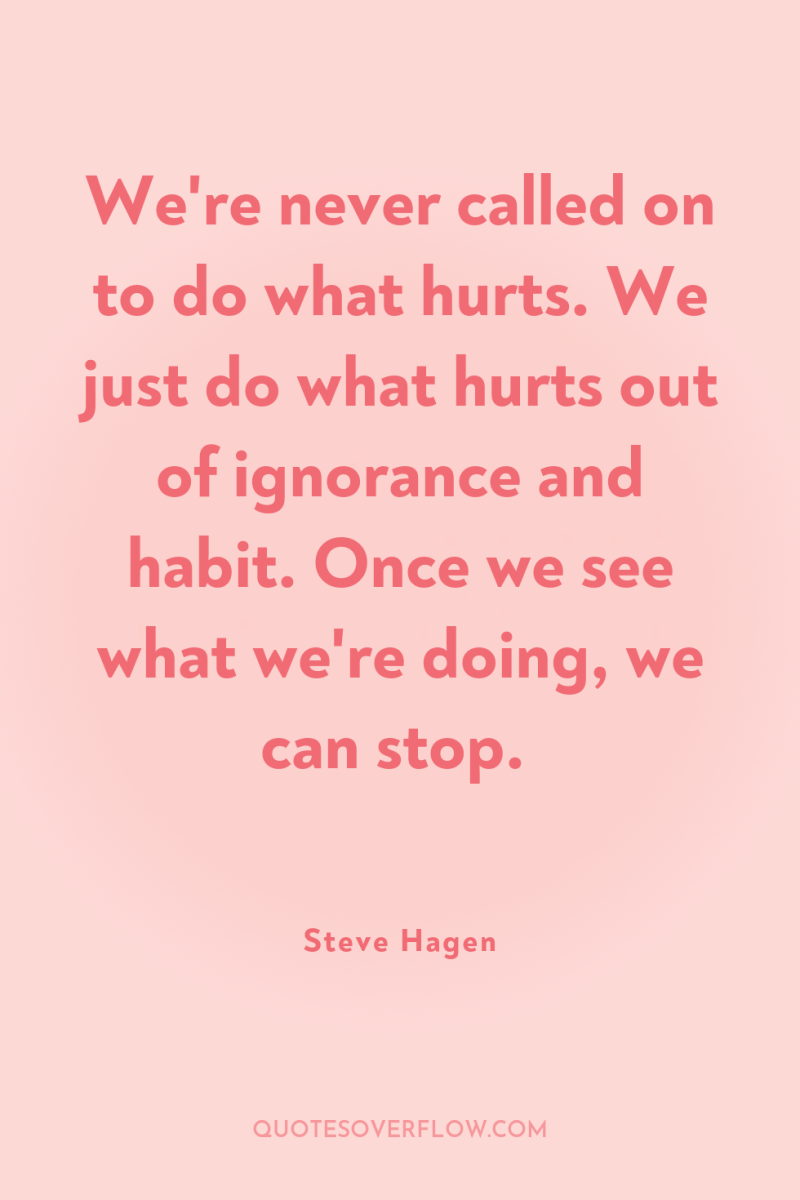
1
We're never called on to do what hurts. We just do what hurts out of ignorance and habit. Once we see what we're doing, we can stop.Steve Hagen
2
The Buddha encouraged people to "know for yourselves that certain things are unwholesome and wrong. And when you do, then give them up. And when you know for yourselves that certain things are wholesome and good, then accept them and follow them." The message is always to examine and see for yourself. When you see for yourself what is true-and that's really the only way that you can genuinely know anything-then embrace it. Until then, just suspend judgment and criticism.Steve Hagen
3
The buddha-dharma does not invite us to dabble in abstract notions. Rather, the task it presents us with is to attend to what we actually experience, right in this moment. You don't have to look "over there." You don't have to figure anything out. You don't have to acquire anything. And you don't have to run off to Tibet, or Japan, or anywhere else. You wake up right here. In fact, you can only wake up right here. So you don't have to do the long search, the frantic chase, the painful quest. You're already right where you need to be.Steve Hagen
4
The buddha-dharma … is about directly seeing Truth, prior to forming any ideas about it. It is about responding to each particular situation as it comes … , not according to some … program of dos and don'ts.Steve Hagen
5
[T]here is really nothing 'out there' to get because, already, within this moment, everything is whole and complete.Steve Hagen
6
The impossibility of arriving at Truth by giving up your own authority and following the lights of others. Such a path will only lead to an opinion.Steve Hagen
7
[I]mpermanence [is] the very thing that makes [life] vibrant, wonderful, and alive.Steve Hagen
8
[W]hen you practise right meditation, you 'cease from practice based on intellectual understanding, pursuing words and following speech, and learn the backward step that turns your light inwardly to illuminate your self.Steve Hagen
9
[A] book is not merely a book, it is the sun as well.Steve Hagen
10
[W]e have endless opportunities to forget the self — in planting a tree for future generations; in creating a poem, a meal, a vessel of clay;Steve Hagen
11
There's no rule in the end, but only the situation and the inclination of your mindSteve Hagen
12
[H]ow can something cease to exist that has no solid existence in the first place?Steve Hagen
13
The only way we can be free in each moment is to become what each moment is.Steve Hagen
14
How can a hard and fast view of a world that is never hard and fast possibly be accurate?Steve Hagen
15
Truth is not … something to believe or disbelieve. The things we believe are always less than Truth[.]Steve Hagen
16
[A] view of the world is nothing more than a set of beliefs, a way to freeze the world in our mind. … [T]his can never match Reality, … because the world isn't frozen.Steve Hagen
17
We can only be here. We can't leave. We are always here.Steve Hagen
18
If your idea of good opposes something else, you can be sure that [it] is not absolute or certain.Steve Hagen
19
Belief is at best an educated, informed conjecture about Reality.Steve Hagen
20
Good and bad aren't absolutes. They are beliefs, judgements, ideas based on limited knowledge as well as on the inclinations of our minds.Steve Hagen
21
Good times come and go. And bad times do the same.Steve Hagen
22
[E]ven in getting the wonderful things we long for, we tend to live in want of something more[.]Steve Hagen
23
We have all sorts of stories about heaven and hell, about oblivion and nothingness, about 'coming back, ' and so on. But they are all stories.Steve Hagen
24
Belief may serve as a useful stopgap measure in the absence of actual experience, but once you see … [it] becomes unnecessary.Steve Hagen
25
There's nothing you can find - … nothing you can even imagine — that doesn't originate, develop, or exist in relation to other things.Steve Hagen
26
We imagine that things come into existence, endure for a while, and then pass out of existenceSteve Hagen
27
To forget the self is to remember that we don't exist alone, but in relation to other people, to other creatures, to the planet, and to the universe.Steve Hagen
28
[F]ocus not on ourselves as a force in charge of the manipulation of others, but on how our lives interpenetrate those of others — and … all creatures of a dynamic universe.Steve Hagen